Table of Contents
- AI in Healthcare – Quick Overview Statistics
- Why Should AI be the Future of Healthcare?
- AI in Healthcare Worldwide Statistics
- Artificial Intelligence in Drug Discovery, By Component Statistics
- Machine Learning and AI for Healthcare Diagnostics Statistics
- Professionals’ Opinion Regarding the Adoption of AI in Healthcare
- AI in Healthcare Statistics – By Country
- According to the Pew Research Survey
- Healthcare Chatbots Market, by Component Statistics
- Top Companies in AI in the Healthcare Market
- Recent Developments
- Wrap UP
- FAQs
AI in Healthcare Statistics – Currently, we are living in the era of technology, especially in smart and advanced technologies.
Technological advancements make it possible to make decisions faster than humans and carry out actions more quickly. AI in healthcare statistics will help you to get insights about technological advancements in the healthcare sector.
Artificial Intelligence (AI) is emerging as a functioning tool that is gaining popularity in all sectors across the globe.
The healthcare industry is continuously evolving with the complexity and rise of data in healthcare, thus Artificial Intelligence is increasingly being applied in the healthcare sector.
Artificial Intelligence is a multi-billion-dollar industry, and it is now emerging in healthcare sectors, making it possible to provide better healthcare services.
The rising need for more efficient and effective AI-based healthcare solutions promotes the healthcare industry to adopt AI-based solutions and services.
AI in Healthcare – Quick Overview Statistics
Artificial Intelligence in healthcare refers to the use of advanced computer algorithms and machine learning techniques to analyze data in the healthcare sector to provide better healthcare services.
AI helps healthcare providers make more accurate and real-time diagnoses, personalize treatment plans, and improve patient safety by identifying health risks earlier.
Types of AI Applications in Healthcare Statistics
- Medical imaging analysis
- Natural language processing (NLP)
- Disease prediction and risk assessment
- Virtual Assistants and Chabot’s
- Drug discovery and development
- Robot-assisted surgery
- Patient engagement
- Diagnosis and treatment
- Machine learning
Why Should AI be the Future of Healthcare?
Artificial Intelligence (AI) and machine learning solutions are transforming the way healthcare is delivered.
Healthcare organizations across the globe accumulated vast data sets in the form of health records and images, claims data, population data, and clinical trial data.
With the help of deep learning from AI, healthcare organizations can use algorithms to help them make better business and clinical decisions and improve the quality of experiences they provide.
Global AI in Healthcare Market Statistics
According to market.us, in 2022, the Global Generative AI in Healthcare Market was valued at USD 0.8 billion and is expected to be valued at USD 17.2 billion in 2032.
Between 2023 and 2032, this market is estimated to register the highest CAGR of 37%. Market growth is driven by the surging number of patient health-related digital data, the growing need for personalized medication, and rising healthcare costs.
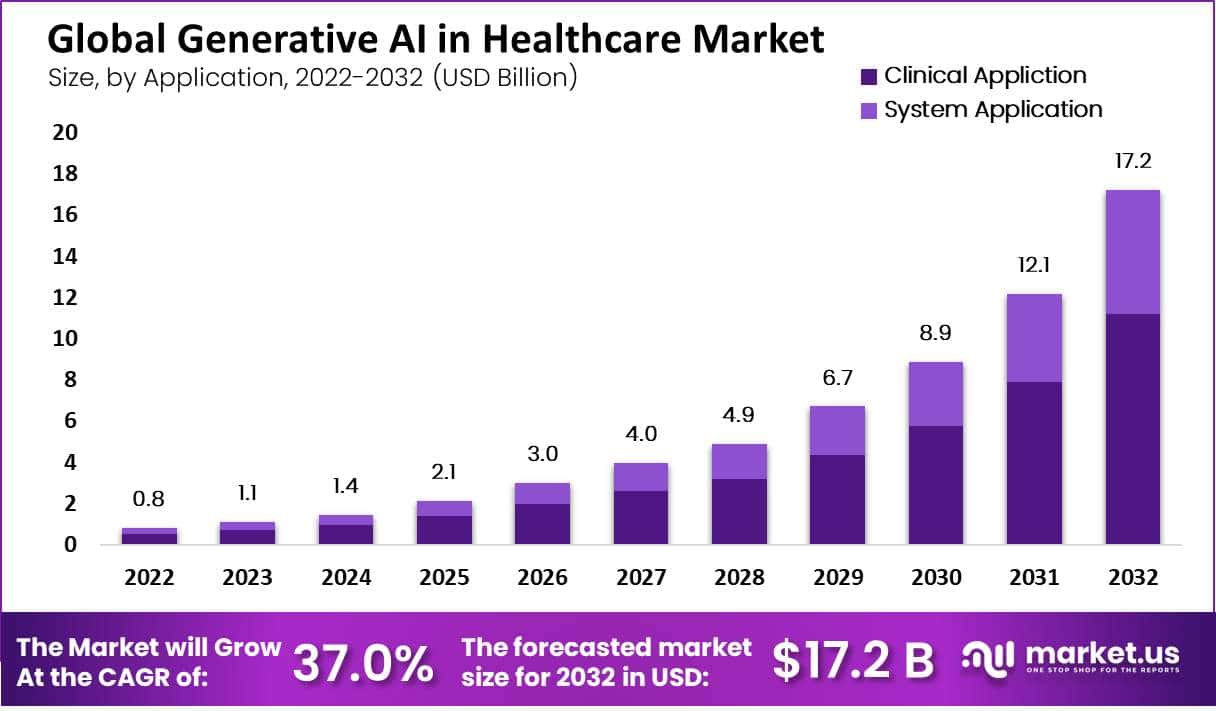
AI in Healthcare Worldwide Statistics
- Less than 10% of healthcare organizations have been utilizing AI for more than 5 years.
- 4 in 10 Americans think AI in health and medicine would reduce the number of mistakes
- About 45% of healthcare services worldwide adopted data integration software for their organizations.
- 36% of organizations implemented natural language processing software.
- North America is dominant in global AI in the healthcare market with the largest market share of 59.1%.
- By 2030, annual healthcare spending in the United States is expected to reach $6.8 trillion.
- The government share of this spending is projected to be 48% by 2030, driven by increases in Medicare enrolment, as more than 10,000 Americans become eligible for Medicare each day.
- 1.8% of organizations in the United States use machine learning in healthcare services.
- 1.3% of healthcare organizations use natural-language processing.
- In 2022, 12.6% of workers were employed at firms that utilize AI in healthcare.
- 51% of US adults who say ethnic biases in healthcare are a problem believe AI will reduce bias.
- 75.7% of radiologists considered AI-based algorithmic results reliable.
- 65% of US adults want AI to be used in their cancer screening.
- According to a Deloitte survey of 1,100 US managers whose organizations were already pursuing AI, 63% of companies surveyed were employing machine learning in their business.
- Artificial Intelligence is capable of accurately diagnosing diseases in 87% of cases.
- In contrast, health condition detection by humans had an 86% accuracy rate.
- According to Forbes, AI-assisted robotics surgery leads to a 21% reduction in patient hospital stays.
- Virtual nursing assistant with the help of Artificial Intelligence (AI) saves the healthcare industry USD 20 billion annually.
(Source: Statista, market.us, Whitehouse, FreeAgent CRM, NIH, Analytics insight, Forbes)
Artificial Intelligence in Drug Discovery, By Component Statistics
The applications of artificial intelligence are increasing in every industry. The rising use of artificial intelligence in the pharmaceutical industry has seen significant growth in the last few years.
This growth of artificial intelligence in the pharmaceutical industry is due to the wide application of AI in the industry. One such application of artificial intelligence in the pharmaceutical industry is used for drug discovery.
Artificial intelligence is used in drug discovery for many operations, such as recognizing the lead and hit compounds, faster validation of the drug target, and efficiently optimizing the drug structure design.
Other applications of AI in drug discovery include polypharmacology, chemical synthesis, drug repurposing, and drug screening.
According to market.us, the global artificial intelligence in drug discovery market was valued at USD 1.2 billion in 2022. Between 2023 and 2032, this market is estimated to register the highest CAGR of 27.5%. It is expected to reach USD 12.8 billion by 2032.
The market for AI in drug discovery is dominated by North America, which holds a lucrative market share of 56.4% and revenue of USD 0.68 billion.
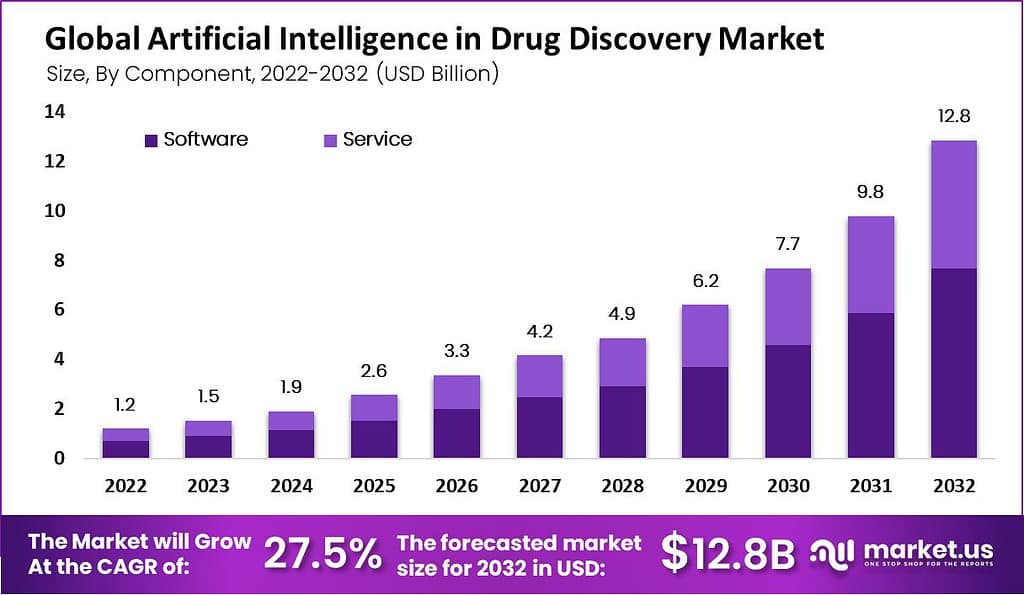
Machine Learning and AI for Healthcare Diagnostics Statistics
- Machine learning (ML) and artificial intelligence (AI) are two of the most widely used technologies in the world.
- More than 40% of industry experts already utilize AI and machine learning regularly. These algorithms can be trained to analyze medical images like CT scans, MRI images, X-rays, etc., to find early signs of diseases such as cancer.
- A recent meta-analysis found that ML algorithms perform the same tasks as human experts, with 87% sensitivity and 92% accuracy.
- Deep learning also performs the same tasks as human experts, with 86.4% sensitivity and 90.5% accuracy.
(Source: Analytics Vidhya)
Professionals’ Opinion Regarding the Adoption of AI in Healthcare
- About 59% of professionals believe that AI delivers significant cost-effective services.
- About 56% of professionals said that their response to COVID-19 gas caused them to shift towards the adoption of AI in healthcare services.
- 51% of professionals believe that they will achieve their goals faster by using AI algorithms.
- 55% of professionals reported that healthcare outcomes are improving by using AI in healthcare.
- More than 37% of professionals want to use AI tools to assign codes for accurate diagnosis, facilities, and procedures.
(Source: HealthITAnalytics)
Global Healthcare Artificial Intelligence Market Value 2026, By Application
Artificial Intelligence (AI) has several applications in the healthcare sector. The most significant application of AI is in robot-assisted surgery. This statistic is about the forecast value of the artificial intelligence healthcare market, by application, in 2026.
- The market for AI-assisted robotic surgery is expected to grow at the fastest CAGR and is expected to hold revenue of USD 40 billion by 2026, followed by virtual nursing assistant revenue of USD 20 billion by 2026.
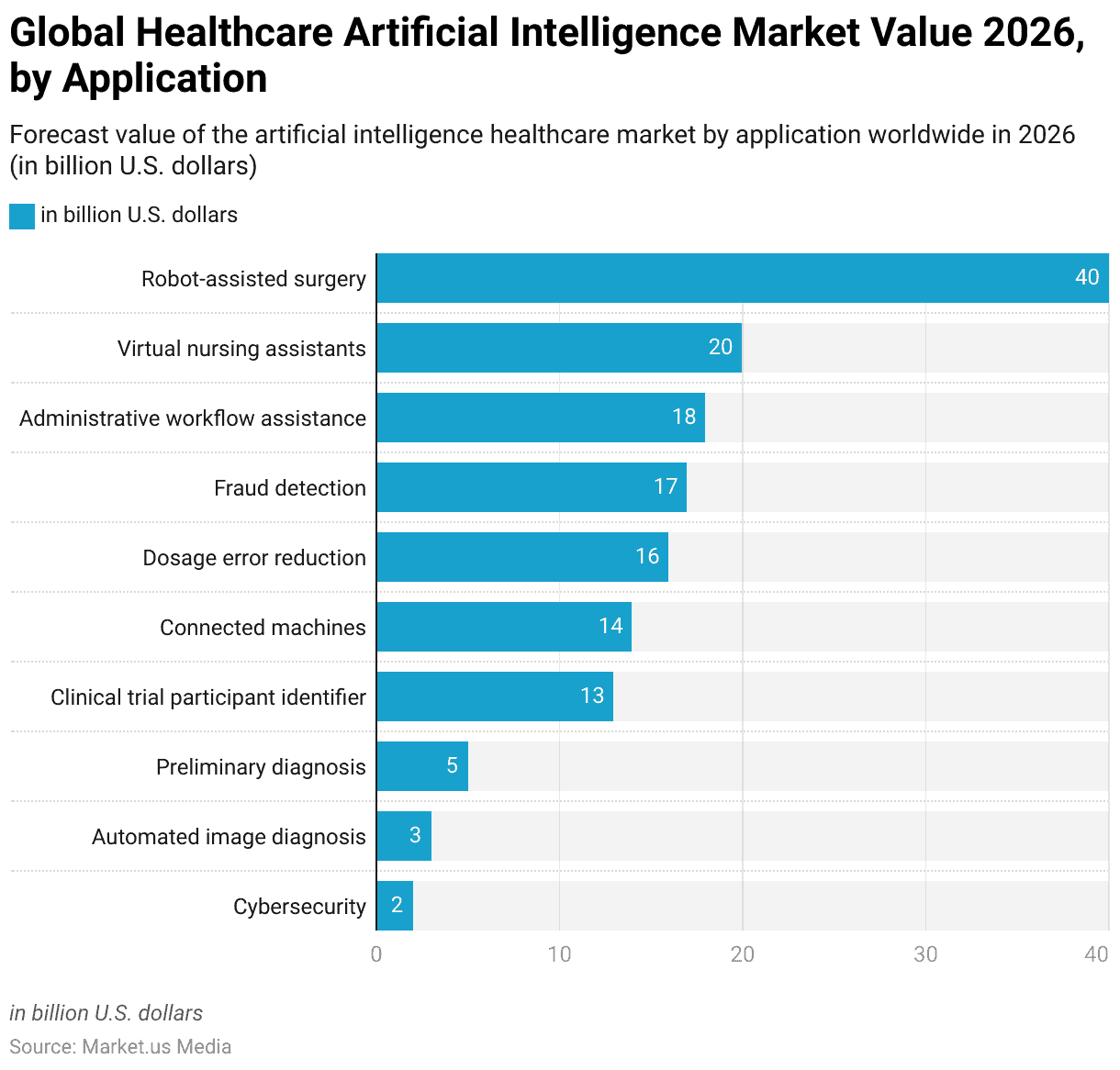
Forecasted Value of Annual Benefits of AI Tech in Healthcare in 2026
- It is expected that in 2026, the value of potential annual benefits of using robot-assisted surgery in healthcare settings worldwide was forecast to amount to 40 billion U.S. dollars.
- The value of the potential annual benefits of using virtual nursing assistants in healthcare settings worldwide is forecast to amount to USD 20 billion.
- Furthermore, it was forecasted that the annual value of using administrative workflow assistance AI applications would amount to 20 billion U.S. dollars.
(Source: Statista)
AI in Healthcare Statistics – By Country
The United States
The United States is one of the leading countries in the adoption of AI in healthcare. This stat shows discomfort among Americans with the use of AI in their healthcare.
- The majority of Americans (40%) think that the use of Artificial Intelligence (AI) in health and medicine would reduce the mistakes made by healthcare professionals, but only 27% of Americans think that AI does not reduce the mistakes made by their healthcare provider.
- About 60% of people in the United States would be uncomfortable with providers relying on AI in their healthcare.
- 40% of adults feel comfortable with providers relying on AI in their healthcare.
- 6 in 10 adults in the United States say they would feel uncomfortable if their healthcare provider relied on AI to diagnose diseases and recommend treatments.
(Source: Pew Research)
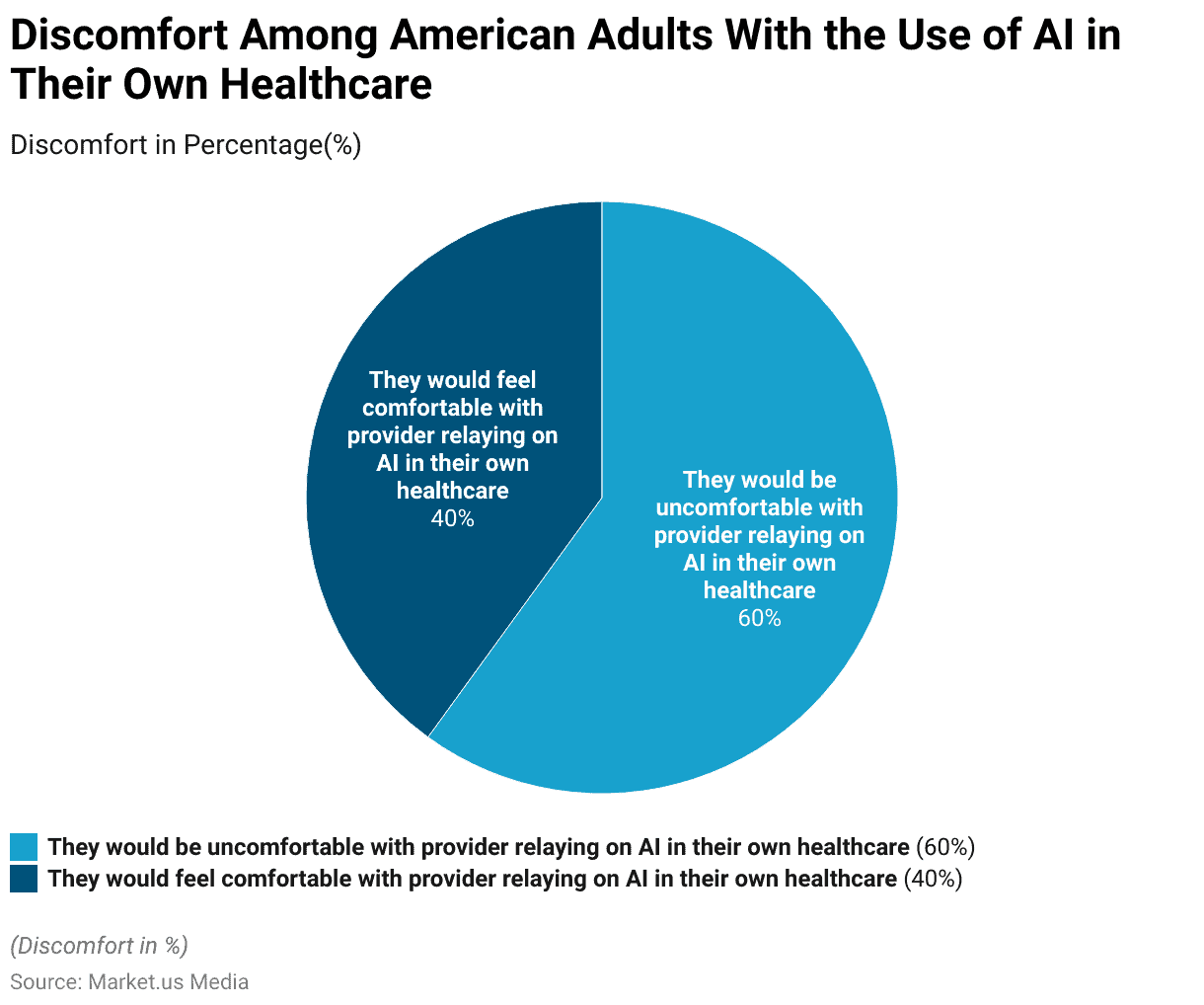
Opinion of Adults in the United States Regarding Use of AI in Healthcare and Medicines Statistics
The survey found that the majority of the public is unconvinced regarding the use of AI in health and medicine
According to the Pew Research Survey
- 38% of US adults say that AI being used to do things like diagnosis and recommended treatments will give better health outcomes for patients.
- 33% of adults say it would be worse to use AI in the diagnosis of diseases.
- 27% of adults say it would make a big difference in treatment.
| It would make a big difference in the treatment | Percentage of Adults |
| It will give better health outcomes for patients | 38% |
| It would be worse to use AI in the diagnosis of diseases | 33% |
| It would make much difference in the treatment | 27% |
US Adults’ Concerns about AI’s Potential Impact on the Connection Between Patients and Healthcare Professionals
- 57% of adults in the United States think that the use of Artificial Intelligence (AI) in the diagnosis of diseases and recommended treatments would make the relationship between patients and healthcare professionals worse.
- Only 13% of adults think that the use of AI in treatment and diagnosis would be better.
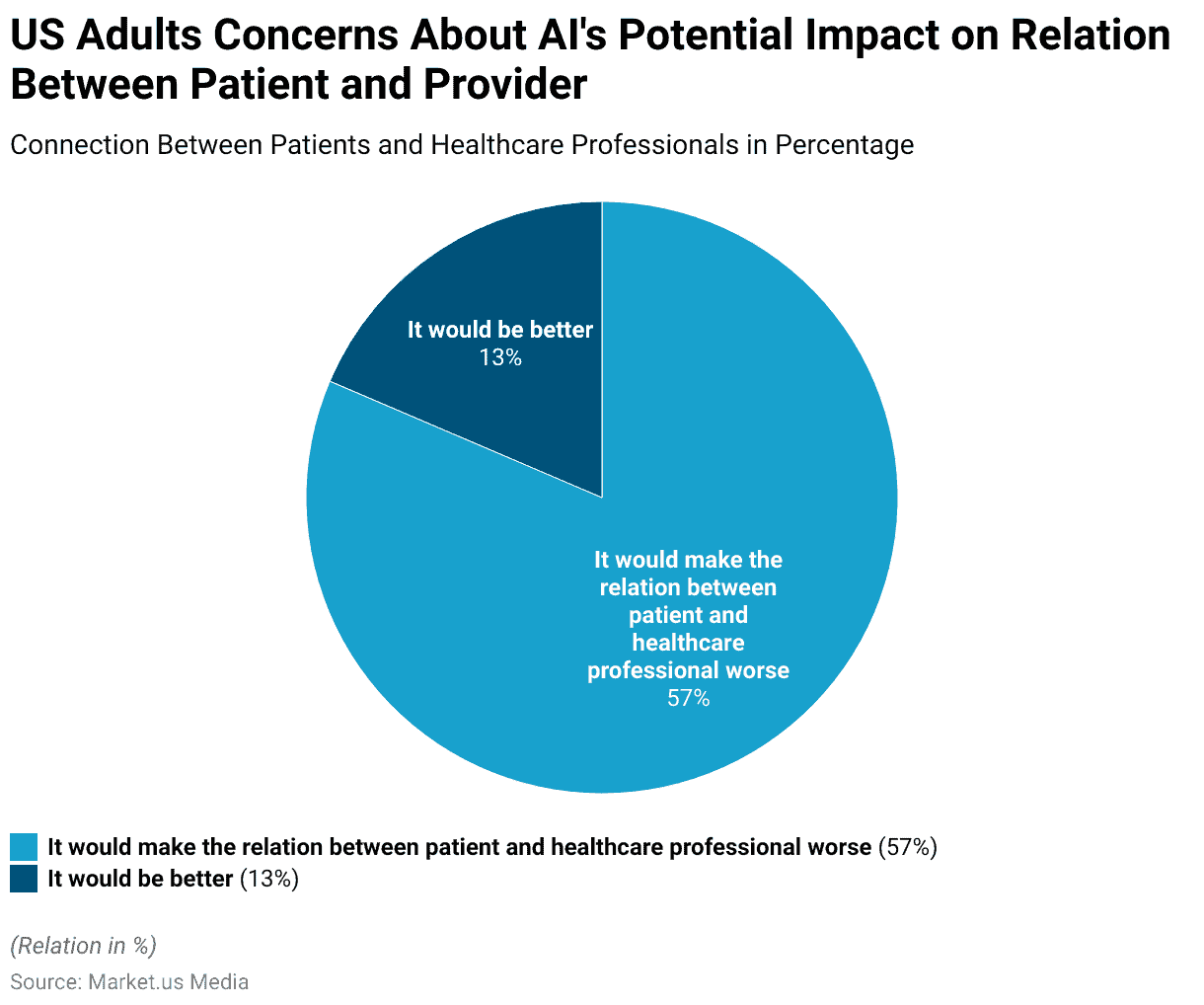
Discomfort in the Use of AI in Disease Diagnosis and Treatment Among the US Adults, by Gender
- 54% of men say they would be uncomfortable with the use of AI in treatment and diagnosis by their healthcare provider.
- As compared to men, 66% of women say it would be uncomfortable for their healthcare provider to rely on AI for treatment and diagnosis.
Adults’ Opinion About Use of AI in Treatment and Diagnosis, by Education
Men and younger adults who have completed their graduation and any degree are more positive regarding the use of AI in treatment.
- Approximately 50% of those with postgraduate degrees think that the use of AI in the diagnosis of diseases would lead to better health outcomes for patients.
- Only 26% of those with postgraduate degrees think that it would lead to worse outcomes for the patients.
US Adults’ Opinion About Bias and Unfair Treatment in Health and Medicines, by Patients’ Race or Ethnicity
- 64% of Black Adults in the United States say that bias based on patients’ race or ethnicity is a major problem in health and medicine.
- 42% of Hispanic adults say that it is a major problem.
- 39% of English-speaking Asian Adults say that it is a major problem.
- 27% of White adults describe bias and unfair treatment related to a patient’s race or ethnicity as a major problem in health and medicine.
Americans’ Views On AI Applications Used in Cancer Screening, Surgery, and Mental Health Support
- About 65% of American adults say that they would probably want AI to be used for their skin cancer screening, 55% of adults say that AI would make skin cancer diagnosis more accurate, and only 13% of adults believe that it would be less accurate.
- About 72% of men and 58% of women say that they would want AI for screening skin cancer.
- About 26% of US adults say that pain management treatment would get better by using AI, and 32% of US adults say that this would lead to worse pain treatment management.
- About 8 in 10 US adults (79%) say they would not want to use an AI Chatbot if they were seeking mental health support.
- Only 20% of US adults say that they would want chatbots if they were seeking mental health support.
China
China is investing more and more in AI and has shown rapid progress in healthcare technology. The Chinese government made AI a national priority, with initiatives to develop advanced AI technologies.
- China’s AI in the healthcare market accounted for revenue of USD 0.55 billion, and the market is expected to growt of USD 11.91 billion by 2030, registering a CAGR of 46.72% during the forecast period.
- China is suffering from more than 95 million patients with depression and stress, and AI in healthcare management helps patients to provide mental health support.
(Source: insights10, EqualOcean)
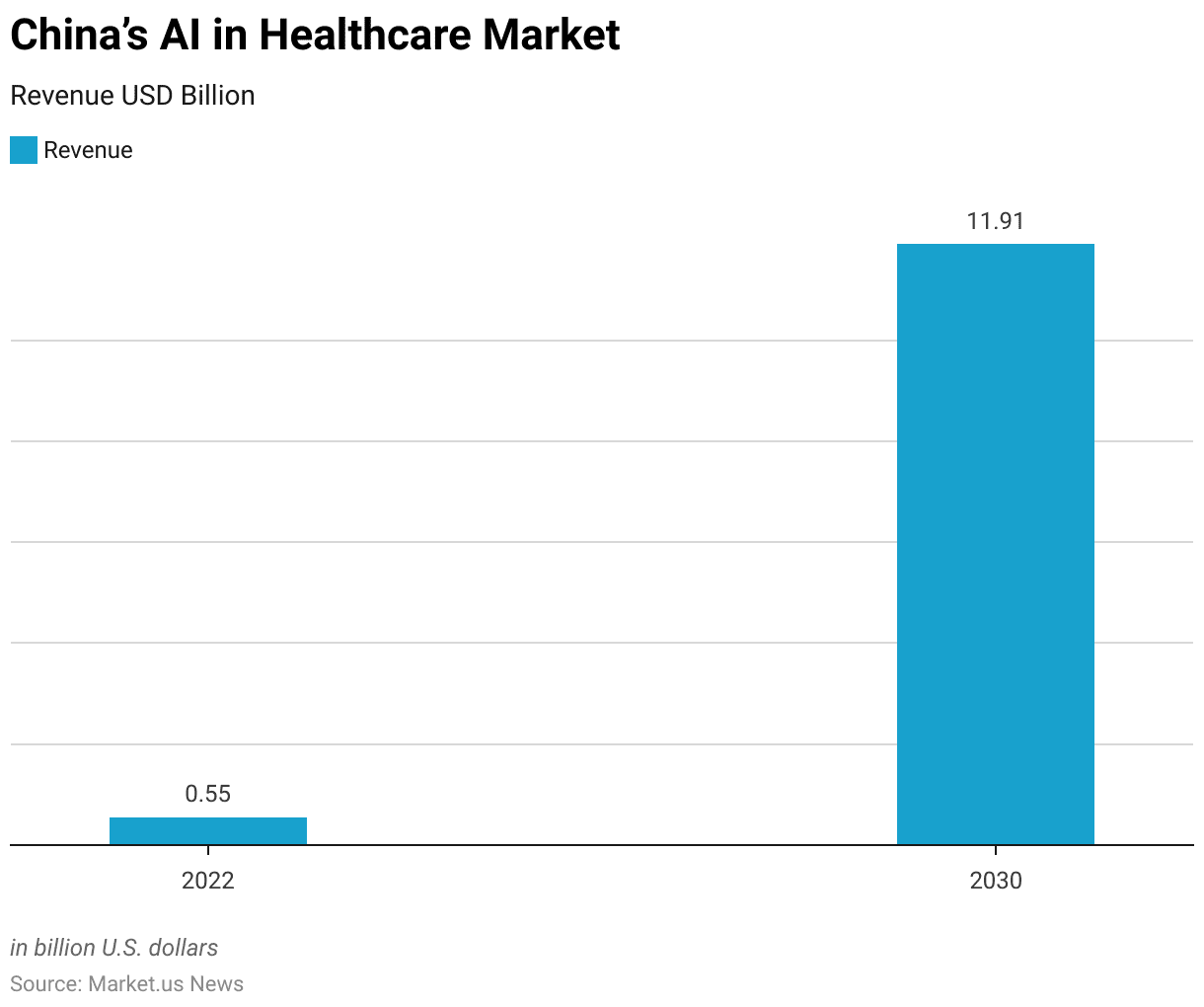
United Kingdom
- The United Kingdom has been actively exploring AI in the healthcare sector through initiatives such as the NHS AI Lab.
- The United Kingdom AI in Healthcare Market accounted for revenue of USD.0.18 billion in 2022, and the market is expected to grow to a revenue of USD 3.18 billion by 2032, registering a Compound Annual Growth Rate (CAGR 2022-2032) of 43.22%.
South Korea
South Korea has been actively exploring its footprints in AI technologies in the healthcare sector, particularly in areas such as medical imaging, robotics, and telemedicine.
- In 2019, the market size of the AI healthcare market in South Korea was 55.4 billion South Korean won, and the market is expected to reach a revenue of 246.5 billion South Korean won by the end of the year 2023.
(Source: Statista)
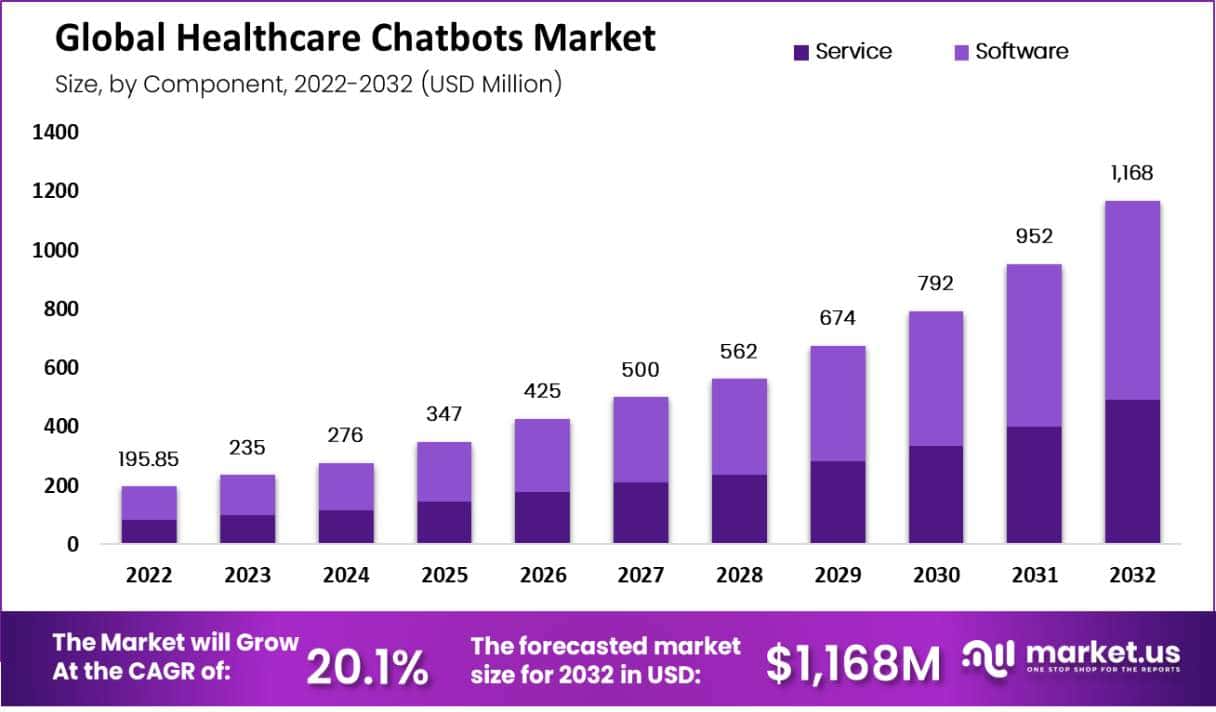
Healthcare Chatbots Market, by Component Statistics
According to market.us, in 2022, the Global Healthcare Chatbots market size was valued at USD 195.85 million and is expected to reach USD 1,167.7 million in 2032. This market is estimated to register a CAGR of 20.1% between 2023 and 2032.

Top Companies in AI in the Healthcare Market
IBM Watson Health
IBM Watson Health is a subdivision of IBM that focuses on applying AI and cognitive computing technologies in the field of healthcare. They provide clinical decision support tools that leverage AI and natural language processing.
In 2022, IBM’s segment generated revenue of USD 25 billion. The total company’s revenue was around USD 60.53 billion in 2022. IBM Watson Health provides AI-powered IBM Watson Natural Language Understanding (NLU) and Healthcare Chatbot for healthcare platforms.
NVIDIA Corporation
NVIDIA Corporation is primarily known for its graphics processing units (GPUs). NVIDIAs GPU have been used in developing advanced AI algorithms and software frameworks for medical analysis.
The company provides AI-powered medical devices for diagnostic imaging, digital surgery, digital pathology, genomic sequencing, and patient monitoring. The quarterly revenue of NVIDIA is $6.05 billion in 2023, down 21% from a year 2022.
Microsoft
Microsoft is a leading company in developing AI healthcare solutions for the healthcare industry. Microsoft’s Azure cloud platform offers various AI tools and services for healthcare organizations, including Azure Machine Learning.
Microsoft’s revenue for the twelve months ending March 31, 2023, was $207.591B, a 7.81% increase year-over-year. Microsoft offers services and software such as Microsoft Cloud, Azure Space, and Microsoft Viva for the healthcare industry.
GE Healthcare
GE Healthcare is a subsidiary of General Electric Company that focuses on providing medical technologies. They have integrated AI capabilities into their imaging systems, such as Computed Tomography (CT), magnetic resonance imaging, and ultrasound.
In 2022, the revenue for GE Healthcare totaled 17.72 billion U.S. dollars. GE Healthcare provides AI-powered Edison™, which is a Healthcare intelligence platform designed to help to achieve greater efficiency, improve patient outcomes, and increase access to care.
Medtronic
Medtronic is a leading medical technology company that implements AI technologies in various healthcare applications. They have been involved in the development of AI-driven robotics systems and surgical assistant tools.
The company provides advanced surgical technologies such as Ablation Systems, Electrosurgical Instruments, and vessel sealing for the healthcare industry. Medtronic’s revenue for the twelve months ending January 31, 2023, was $30.772B, a 3.19% decline year-over-year. Medtronic’s annual revenue for 2022 was $31.686B, a 5.21% increase from 2021.
Recent Developments
Acquisitions and Mergers:
- Google’s acquisition of Verily Life Sciences in a deal valued at $2.1 billion aimed at integrating AI-driven healthcare solutions.
- Philips’ merger with BioTelemetry to enhance AI-powered remote patient monitoring capabilities is valued at approximately $2.8 billion.
New Product Launches:
- IBM Watson Health launched Watson Health Imaging AI, focusing on AI-powered medical imaging analysis to improve diagnostic accuracy.
- NVIDIA introduced Clara Holoscan AI, leveraging AI for advanced medical visualization and workflow optimization.
Funding and Investments:
- Olive AI secured $400 million in Series E funding to expand its AI-powered automation solutions for healthcare administration.
- Caption Health raised $150 million to further develop its AI-guided ultrasound technology for improving heart disease diagnosis.
Strategic Partnerships:
- Mayo Clinic partnered with Nference to utilize AI for accelerating biomedical discoveries and enhancing patient care outcomes.
- Cerner collaborated with Amazon Web Services (AWS) to integrate AWS’s AI and machine learning services into Cerner’s healthcare solutions.
Regulatory Advancements:
- FDA’s approval of AI algorithms like IDx-DR for autonomous diagnostic use in diabetic retinopathy marked a significant regulatory milestone.
- EU’s new regulations on AI in healthcare ensure ethical AI usage while promoting innovation and patient safety.
Market Growth and Projections:
- AI applications in medical imaging are expected to dominate, driven by advancements in machine learning and image recognition technologies.
Wrap UP
AI in Healthcare Statistics: Artificial Intelligence has the potential to revolutionize the healthcare industry by improving patient outcomes. Enhancing diagnostic accuracy, treatment plans, and transforming the delivery of care.
Several companies in AI in the healthcare market, such as IBM-Watson Health, Google DeepMind, NVIDIA, Microsoft, GE Healthcare, and Medtronic, are revolutionizing the use of AI technologies in the healthcare sector.
On the other hand, it is also important to consider that there are several risks to data privacy and accuracy in AI technologies.
Many individuals across the globe are still not aware of the benefits of AI in disease diagnosis and treatment.
Overall, AI in healthcare is a rapidly evolving field and is increasingly adopted by developed countries. As technological advancements are increasing.
It is expected that AI will continue to play an important role in making the future of healthcare, improving patient outcomes, and transforming the way healthcare is delivered.
FAQs
Artificial Intelligence in healthcare refers to the use of advanced computer algorithms and machine learning techniques to analyze data in the healthcare sector to provide better healthcare services.
AI helps healthcare providers make more accurate and real-time diagnoses, personalize treatment plans, and improve patient safety by identifying health risks earlier.
According to market.us, the global artificial intelligence in the healthcare market was valued at USD 9.81 billion in 2022. It is projected to reach USD 258.5 billion at a CAGR of 38.73% between 2023 and 2032.
Artificial intelligence is used in drug discovery for many operations, such as recognizing the lead and hit compounds, faster validation of the drug target, and efficiently optimizing the drug structure design. Other applications of AI in drug discovery include polypharmacology, chemical synthesis, drug repurposing, and drug screening.
According to market.us, the global artificial intelligence in drug discovery market was valued at USD 1.2 billion in 2022. Between 2023 and 2032, this market is estimated to register the highest CAGR of 27.5%. It is expected to reach USD 12.8 billion by 2032.


